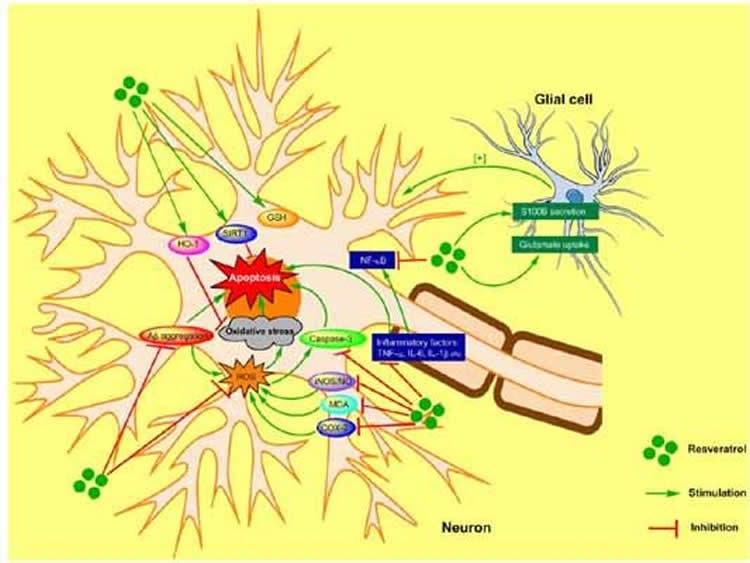Summary: A new study reports reveratrol could be a therapeutic candidate for the management and treatment of Alzheimer’s disease.
Source: Bentham Science Publishers.
Resveratrol is a naturally occurring polyphenolic phytochemical produced in several plants, especially grapes skin and seeds. One epidemiological study reported a positive association between moderate red wine consumption and a low incidence of cardiovascular disease, known as the “French Paradox.”
The neuroprotective effects of resveratrol for the treatment of Alzheimer’s disease (AD) have been investigated in various in vitro and in vivo models of AD. Despite the high bioactivity of resveratrol in AD, there is poor bioavailability of resveratrol, that is, the concentrations required producing favourable biological effects in the brain and neuronal cells are insufficient to demonstrate efficacy in humans. Therefore, successful clinical application of resveratrol as a single ‘take home’ oral therapy alone presents a major challenge for the treatment of AD.
We propose herein a novel combination therapy consisting of an agent for chelating redox-active metals (Fe2+) and/or an antioxidant to reduce damage caused by residual oxygen free radicals, in addition to resveratrol, a modulator of AMPK and sirtuin pathways (nuclear transcription).
The addition of resveratrol may have the capacity to increase activity of the NAD+- dependant deacetylases such as sirtuin family enzymes (e.g. SIRT1) and promote improved DNA repair by enhancing PARP enzyme activity through increased production of their essential substrate NAD+, and thus improve cell viability and longevity.

A synergistic combination of a selected antioxidant substances, Fe2+ chelating agents and resveratrol may be expected to provide a more clinically successful treatment.
Source: Bentham Science Publishers
Image Source: This NeuroscienceNews.com image is credited to Dr. Nady Braidy et al, Bentham Science Publishers.
Original Research: Abstract for “Resveratrol as a Potential Therapeutic Candidate for the Treatment and Management of Alzheimer’s Disease” by Nady Braidy, Bat-Erdene Jugder, Anne Poljak, Tharusha Jayasena, Hussein Mansour, Seyed Mohammad Nabavi, Perminder Sachdev and Ross Grant in Current Topics in Medicinal Chemistry. Published online June 2016 doi:10.2174/1568026616666160204121431
[cbtabs][cbtab title=”MLA”]Bentham Science Publishers. “Combination Therapy May Hold The Key to Slowing Down Alzheimer’s.” NeuroscienceNews. NeuroscienceNews, 26 June 2016.
<https://neurosciencenews.com/alzheimers-combination-therapy-4568/>.[/cbtab][cbtab title=”APA”]Bentham Science Publishers. (2016, June 26). Combination Therapy May Hold The Key to Slowing Down Alzheimer’s. NeuroscienceNews. Retrieved June 26, 2016 from https://neurosciencenews.com/alzheimers-combination-therapy-4568/[/cbtab][cbtab title=”Chicago”]Bentham Science Publishers. “Combination Therapy May Hold The Key to Slowing Down Alzheimer’s.” https://neurosciencenews.com/alzheimers-combination-therapy-4568/ (accessed June 26, 2016).[/cbtab][/cbtabs]
Abstract
Resveratrol as a Potential Therapeutic Candidate for the Treatment and Management of Alzheimer’s Disease
Resveratrol (3,4′,5-trihydroxystilbene) is a naturally occurring phytochemical present in red wine, grapes, berries, chocolate and peanuts. Clinically, resveratrol has exhibited significant antioxidant, anti-inflammatory, anti-viral, and anti-cancer properties. Although resveratrol was first isolated in 1940, it was not until the last decade that it was recognised for its potential therapeutic role in reducing the risk of neurodegeneration, and Alzheimer’s disease (AD) in particular. AD is the primary cause of progressive dementia. Resveratrol has demonstrated neuroprotective effects in several in vitro and in vivo models of AD. Apart from its potent antioxidant and anti-inflammatory roles, evidence suggests that resveratrol also facilitates non-amyloidogenic breakdown of the amyloid precursor protein (APP), and promotes removal of neurotoxic amyloid beta (Aβ) peptides, a critical step in preventing and slowing down AD pathology. Resveratrol also reduces damage to neuronal cells via a variety of additional mechanisms, most notably is the activation of NAD+-dependent histone deacetylases enzymes, termed sirtuins. However in spite of the considerable advances in clarifying the mechanism of action of resveratrol, it is unlikely to be effective as monotherapy in AD due to its poor bioavailability, biotransformation, and requisite synergism with other dietary factors. This review summarizes the relevance of resveratrol in the pathophysiology of AD. It also highlights why resveratrol alone may not be an effective single therapy, and how resveratrol coupled to other compounds might yet prove an effective therapy with multiple targets.
“Resveratrol as a Potential Therapeutic Candidate for the Treatment and Management of Alzheimer’s Disease” by Nady Braidy, Bat-Erdene Jugder, Anne Poljak, Tharusha Jayasena, Hussein Mansour, Seyed Mohammad Nabavi, Perminder Sachdev and Ross Grant in Current Topics in Medicinal Chemistry. Published online June 2016 doi:10.2174/1568026616666160204121431






